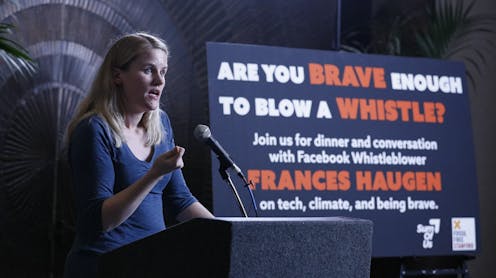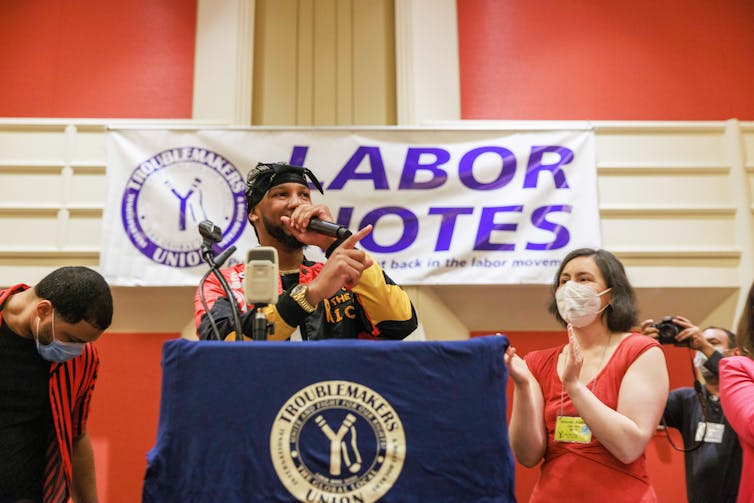No whistleblower is an island – why networks of allies are key to exposing corruption
- Whistleblowers face significant risks when exposing corruption, including retaliation, job loss, and legal threats, making it crucial to have a network of allies who can amplify their message and provide support.
- The “regulators of last resort” – whistleblowers’ allies – play a critical role in helping them navigate the complex web of power and influence. These allies often include experts, journalists, lawyers, and civil society groups who can provide strategic support and resources.
- Organizing whistleblower allies involves careful planning and strategy, including media operations, networking efforts, and legal defense. Nonprofit organizations like the Government Accountability Project have become experts in this domain, using approaches such as “information matchmaking” to connect whistleblowers with the right allies.
- The collective effort of whistleblower allies can tip the balance of power, bringing public opinion to bear on employers or governments that seek to retaliate against whistleblowers. However, even with support, whistleblowers often face ongoing challenges and retaliation years after their disclosures have been made public.
- Whistleblower allies are not a magic bullet solution, but they can help create an environment where whistleblowing is more feasible and effective. By building networks of supporters and advocates, we can work towards creating a culture that values transparency, accountability, and the protection of whistleblowers’ rights.

Whistleblowers – people who expose wrongdoing within their organizations – play a crucial role in holding governments and corporations accountable. But speaking up can come at a cost. People who report misconduct often face retaliation, job loss or legal threats, making whistleblowing risky and challenging. And when legal protections for whistleblowers are weakened, the risks only grow.
That’s exactly the situation many workers face today.
In the U.S., a Trump administration executive order threatens to effectively strip thousands of federal workers’ rights to whistleblower protection. The executive order is part of a larger effort to reclassify civil servants as “at-will” workers who can be sacked at any time for any reason. While federal workers have enjoyed protection against whistleblower reprisal for decades, those safeguards are now under threat. And this comes as private-sector whistleblowers have increasingly faced reprisal, too.
Yet while the risks are real, whistleblowing isn’t impossible. Indeed, after researching whistleblowing for over 10 years, I’ve observed that insiders who successfully sound the alarm often do so with help − by partnering with allies who can amplify their message and help shield them from retaliation.
Meet the ‘regulators of last resort’
My new book, “Regulators of Last Resort: Whistleblowers, the Limits of the Law and the Power of Partnerships,” tells the stories of whistleblowers from Facebook, Amazon, Theranos, U.S. Immigration and Customs Enforcement detention centers and Ireland’s public electricity service. In each case, the worker suffered reprisal and was aggressively silenced. In each case, they persisted, and allies emerged to help.
For Facebook employee Frances Haugen, finding an ally meant teaming up with Wall Street Journal reporter Jeff Horwitz, a specialist in tech who had been writing about Facebook’s misdeeds for some time. When Haugen decided to go public about the social media platform’s knowing exploitation of teenagers and its awareness of the violence incited by poorly regulated non-English versions of its site, Horwitz was pivotal in orchestrating when and how the newspaper articles would appear, helping maximize their impact and granting Haugen control over how her story was told.
This partnership was no accident; Haugen chose the reporter and tech expert carefully. “I auditioned Jeff for a while,” she later told a reporter. “One of the reasons I went with him is that he was less sensationalistic than other choices I could have made.”
Indeed, many whistleblowers disclose with the wrong journalist, leaving themselves open to attack.
At Theranos – a multibillion-dollar biotech company that turned out to be a fraud – a lawyer “friend of a friend” gave whistleblower Erika Cheung critical advice about disclosing to a regulator. This was a lifeline for the recent graduate, who feared for her career and safety after being threatened by bosses and lawyers and warned to stay silent and obey her nondisclosure agreement. Meanwhile, Cheung had no money for formal legal representation. It was that call to the lawyer that made all the difference, Cheung told me. “He said, ‘You can whistleblow.’”
Her contact explained that if she disclosed to the Centers for Medicare & Medicaid Services, she could avail of whistleblower protection and break her NDA. She would have to do it right and focus on the details: to highlight Theranos’ “regulatory noncompliance” and demonstrate the firm was violating the rules for proficiency testing. But all it would require of Cheung was a simple email to the right organization.
Finally, my research also detailed the many colleagues at Amazon who supported whistleblowing manager Chris Smalls in disclosing risks to life and health during the early days of the COVID-19 pandemic in New York. When Smalls was fired for speaking out and subject to racist language in internal memos about the incident that were later leaked, his close colleague Derrick Palmer described his response. “I was appalled,” Palmer said. “I just knew that they wanted to – pretty much – silence the whole effort. Anyone speaking out. That was how they were going to treat them, moving forward. Including myself.”

Jeremy Hogan/SOPA Images/LightRocket via Getty Images
This strengthened Palmer’s determination to help Smalls. Meanwhile, the leaked memo prompted letters of support and emails “from people from all over the country – Amazon workers, non-Amazon workers, that just want to help advocate as well,” as Smalls put it. In the days and weeks after, workers held demonstrations at Amazon facilities all across the U.S., with banners declaring solidarity with the New York warehouse whistleblowers.
No whistleblower is an island
These allies often go overlooked when the media focuses on whistleblowers. But their support is critical, particularly in an era when protections for workers who speak up are coming under increasing threat worldwide.
Organizing whistleblowing allies involves strategy, and some nonprofit and civil society groups have become experts in this domain. Leading the way is the U.S. Government Accountability Project and its “information matchmaking” approach. The idea is simple: Whistleblowers need a whole team of other people – from experts to members of the public – on their side. And this takes planning.
For years, lawyer-activists like those at the Government Accountability Project have been treating whistleblower protection and support efforts as holistic campaigns that entail a media operation and networking effort, as well as a legal defense.
Take the example of Dawn Wooten, a former nurse at the Irwin County Detention Center – a U.S. Immigration and Customs Enforcement contractor – who encountered and disclosed medical misconduct and critical failures. Dana Gold at the Government Accountability Project supported her whistleblowing with other activists, enlisted civil society groups and politicians in the cause, helped land newspaper articles in The Guardian and The New York Times, and even arranged a New Yorker podcast in which Wooten told her story.
The information went viral, and multiple investigations ensued. Within a year, the Department of Homeland Security directed ICE to formally end its contract with the Irwin County Detention Center, citing the revelations made public by Wooten and some of the detained women.
None of this is straightforward. In most whistleblowing disputes, the organization holds the balance of power. It has the files, the witnesses and the money to pay good lawyers. I’ve found that whistleblower allies must work with whatever limited resources they can marshal to give themselves an advantage. This means engaging influential people who might help, including pro bono lawyers, specialists who can give evidence, concerned regulators and beat journalists. In short, what is necessary is experts across all domains who are interested in the story and willing to help. And it’s the collective effort that matters.
Even with this support, however, whistleblowers don’t have it easy. In many high-profile cases where a disclosure is made public and a whistleblower is clearly vindicated and recognized as a courageous truth-teller, they can suffer afterward. Potential employers can balk at the prospect of hiring a whistleblower, even a celebrated one. And vindictive organizations can and do continue retaliating, even years after a story has dropped off the front pages.
Whistleblower allies and their strategies don’t offer a magic bullet. But they can help tip the balance of power, bringing public opinion to bear on an employer bent on reprisal or a government intent on coddling the powerful.
![]()
Kate Kenny does not work for, consult, own shares in or receive funding from any company or organization that would benefit from this article, and has disclosed no relevant affiliations beyond their academic appointment.
